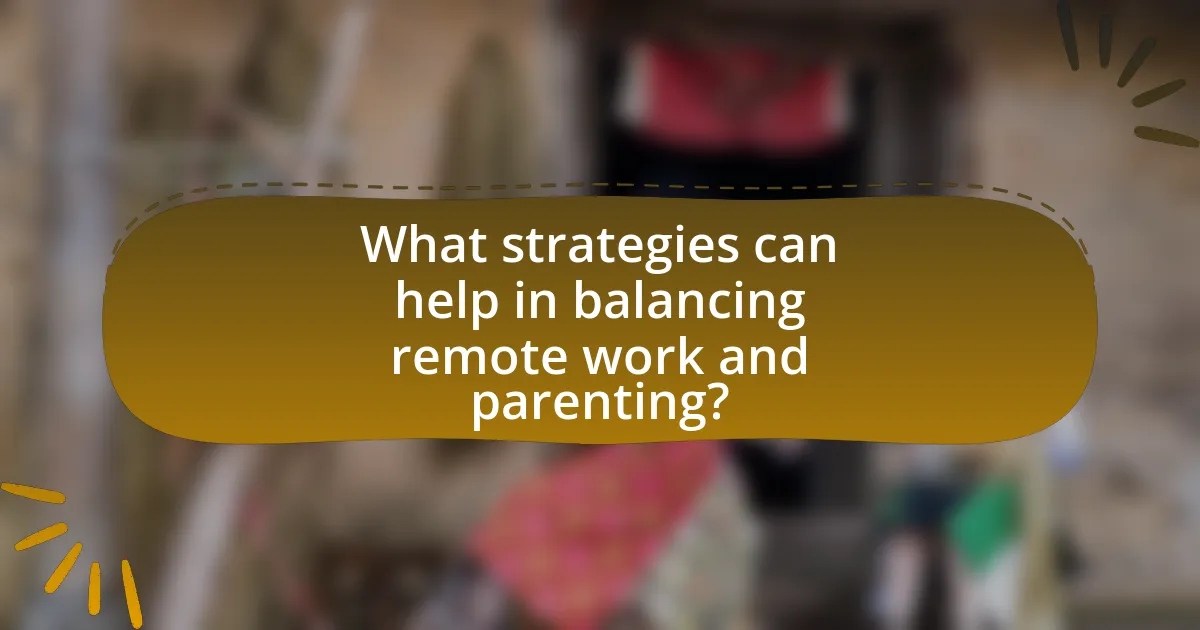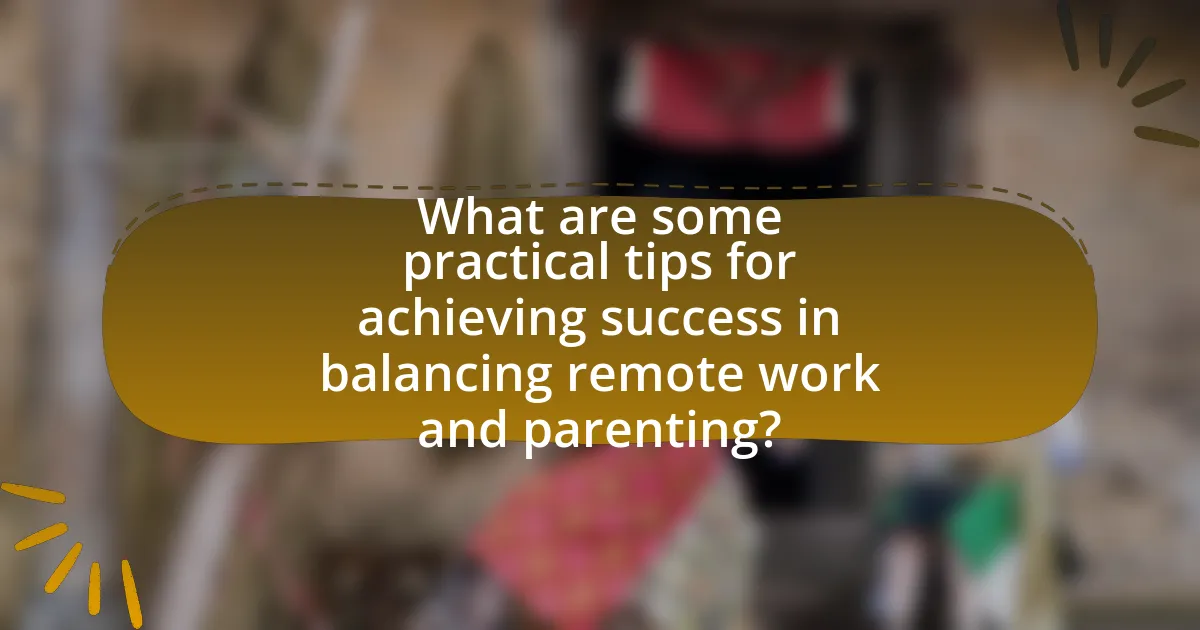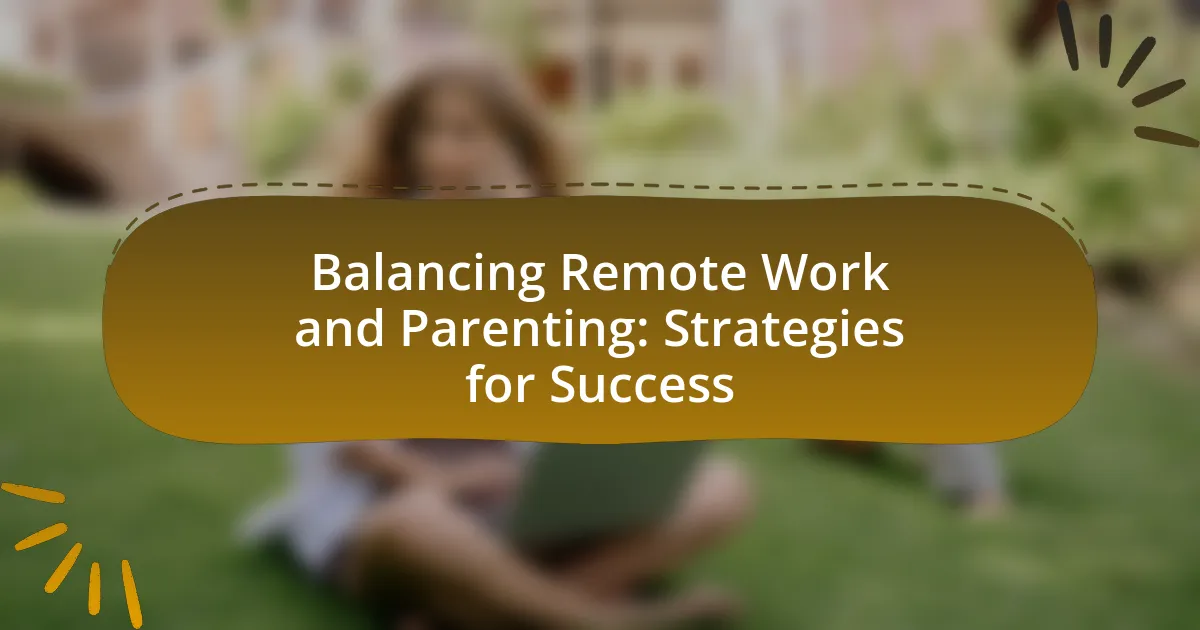The article focuses on the challenges and strategies involved in balancing remote work and parenting. It highlights the importance of creating structured schedules to manage professional responsibilities alongside family duties, as well as the impact of remote work on parenting dynamics. Key challenges include time management, distractions, and maintaining work-life boundaries, which can lead to increased stress if not addressed. The article also discusses effective communication, time management techniques, and the use of online tools to enhance organization and productivity, ultimately emphasizing the benefits of achieving a successful balance for both work and family life.

What does it mean to balance remote work and parenting?
Balancing remote work and parenting means managing the responsibilities of a job conducted from home while simultaneously fulfilling the duties of a parent. This involves creating a structured schedule that accommodates work tasks and parenting activities, ensuring that both professional obligations and family needs are met effectively. Research indicates that 70% of remote workers report challenges in maintaining work-life balance, highlighting the importance of setting boundaries and prioritizing tasks to achieve harmony between these two roles.
How can remote work impact parenting responsibilities?
Remote work can significantly alter parenting responsibilities by allowing for greater flexibility in managing time and tasks. This flexibility enables parents to balance work commitments with childcare, potentially leading to increased involvement in their children’s daily activities, such as helping with homework or attending school events. A study by the Pew Research Center found that 54% of working parents reported that remote work has made it easier to manage their family responsibilities, highlighting the positive impact of flexible work arrangements on parenting. However, remote work can also blur the boundaries between professional and personal life, leading to challenges in dedicating focused time to parenting, which can create stress and affect family dynamics.
What challenges do parents face while working remotely?
Parents face significant challenges while working remotely, primarily including time management, distractions, and maintaining work-life boundaries. Time management becomes difficult as parents juggle professional responsibilities with childcare and household tasks, often leading to extended work hours. Distractions from children and household activities can disrupt focus and productivity, making it hard to complete work tasks efficiently. Additionally, the lack of clear boundaries between work and home life can result in increased stress and burnout, as parents may struggle to switch off from work responsibilities. These challenges are supported by studies indicating that remote work can lead to higher levels of stress and decreased productivity for parents managing both work and family obligations.
How does remote work change the dynamics of family life?
Remote work significantly alters family life dynamics by increasing the amount of time family members spend together while also blurring the boundaries between work and home responsibilities. This shift can lead to enhanced family bonding as parents are more available for daily activities and support, but it can also create challenges such as distractions during work hours and conflicts over shared spaces. Research indicates that 70% of remote workers report improved family relationships due to increased presence at home, yet 60% also experience stress from the overlapping demands of work and family life, highlighting the need for effective time management strategies to navigate these changes.
Why is balancing remote work and parenting important?
Balancing remote work and parenting is important because it ensures both professional responsibilities and family needs are met effectively. This balance fosters a supportive environment for children, promoting their emotional and developmental well-being while allowing parents to maintain productivity in their careers. Research indicates that parents who successfully balance these roles report higher job satisfaction and lower stress levels, which positively impacts family dynamics and children’s behavior. For instance, a study published in the Journal of Family Psychology found that parents who manage work and family responsibilities effectively experience better mental health outcomes, benefiting both their work performance and parenting quality.
What are the potential consequences of poor balance?
Poor balance between remote work and parenting can lead to increased stress and decreased productivity. When individuals struggle to manage their responsibilities effectively, they may experience burnout, which can negatively impact both their work performance and family relationships. Research indicates that high levels of stress can result in mental health issues, such as anxiety and depression, affecting overall well-being. Additionally, poor balance can lead to missed deadlines and reduced quality of work, as well as strained interactions with children, who may feel neglected or less supported.
How can a successful balance benefit both work and family?
A successful balance between work and family enhances productivity and strengthens relationships. When individuals effectively manage their time and responsibilities, they experience reduced stress, leading to improved focus and efficiency at work. Research indicates that employees who maintain a healthy work-life balance report higher job satisfaction and lower turnover rates, which benefits employers through increased retention and morale. Additionally, family members benefit from quality time spent together, fostering emotional connections and support systems that contribute to overall well-being. This dual benefit creates a harmonious environment where both professional and personal lives thrive.

What strategies can help in balancing remote work and parenting?
Establishing a structured schedule is a key strategy for balancing remote work and parenting. By creating designated work hours and specific times for parenting duties, individuals can manage their responsibilities more effectively. Research indicates that maintaining a consistent routine enhances productivity and reduces stress, allowing parents to focus on work tasks during work hours and engage with their children during designated family time. Additionally, utilizing tools such as calendars and task management apps can help in organizing both work and parenting activities, ensuring that neither is neglected.
How can time management improve the balance?
Time management can improve the balance between remote work and parenting by allowing individuals to allocate specific time slots for work tasks and family responsibilities. Effective time management techniques, such as prioritizing tasks and setting clear boundaries, enable parents to focus on work during designated hours while ensuring quality time with their children outside of those hours. Research indicates that individuals who practice structured time management report lower stress levels and greater satisfaction in both work and family life, as they can meet professional obligations without compromising family interactions.
What techniques can parents use to manage their time effectively?
Parents can manage their time effectively by implementing techniques such as prioritization, scheduling, and setting boundaries. Prioritization involves identifying the most important tasks and focusing on them first, which can enhance productivity. Scheduling, through tools like calendars or planners, allows parents to allocate specific time slots for work, family activities, and personal time, ensuring a balanced approach to daily responsibilities. Setting boundaries, such as designating work hours and creating a dedicated workspace, helps minimize distractions and maintain a clear separation between professional and personal life. Research indicates that structured time management strategies can lead to improved efficiency and reduced stress for parents balancing remote work and family obligations.
How can setting boundaries enhance productivity at home?
Setting boundaries enhances productivity at home by creating a structured environment that minimizes distractions and clarifies expectations. When individuals establish clear limits on work hours and personal time, they can focus more effectively on tasks without interruptions. Research indicates that remote workers who set specific work hours report higher productivity levels, as they can allocate dedicated time for work and family responsibilities, reducing the likelihood of burnout. Additionally, boundaries help in managing the overlap between work and personal life, allowing for better time management and increased overall efficiency.
What role does communication play in balancing these responsibilities?
Communication is essential in balancing remote work and parenting responsibilities as it facilitates clear expectations and boundaries. Effective communication between parents and their employers, as well as among family members, ensures that everyone understands their roles and responsibilities, reducing conflicts and misunderstandings. Studies show that remote workers who maintain open lines of communication with their supervisors report higher job satisfaction and productivity, which is crucial when managing parenting duties simultaneously. For instance, a survey by Buffer in 2021 indicated that 20% of remote workers cited communication as a key factor in their ability to balance work and personal life effectively.
How can parents communicate their needs to their employers?
Parents can communicate their needs to their employers by clearly articulating their requirements through structured conversations and formal requests. This involves scheduling a dedicated time to discuss their needs, such as flexible hours or remote work arrangements, ensuring that they present their case with specific examples of how these adjustments can enhance productivity. Research indicates that open communication leads to better workplace relationships and understanding; for instance, a study by the Society for Human Resource Management found that 70% of employees who communicated their needs felt more supported by their employers.
What strategies can families use to communicate effectively with each other?
Families can communicate effectively with each other by establishing regular check-ins and creating a safe space for open dialogue. Regular check-ins, such as family meetings or scheduled one-on-one conversations, allow family members to share their thoughts and feelings, fostering understanding and connection. Creating a safe space involves encouraging honesty without fear of judgment, which promotes transparency and trust. Research indicates that families who engage in consistent communication practices report higher levels of satisfaction and cohesion, highlighting the importance of these strategies in maintaining healthy relationships.

What are some practical tips for achieving success in balancing remote work and parenting?
To achieve success in balancing remote work and parenting, establish a structured daily routine that includes dedicated work hours and specific parenting times. This structure helps create clear boundaries, allowing both work responsibilities and parenting duties to be managed effectively. Research indicates that parents who set defined schedules report higher productivity and reduced stress levels, as they can allocate focused time for work tasks while also being present for their children. Additionally, utilizing tools such as calendars and task management apps can enhance organization and ensure that both work and parenting commitments are met without overlap.
How can parents create a conducive work environment at home?
Parents can create a conducive work environment at home by establishing a dedicated workspace that minimizes distractions. This involves designating a specific area in the home solely for work purposes, which helps to mentally separate work from family life. Research indicates that having a defined workspace can enhance focus and productivity, as it signals to both parents and children that work is being conducted. Additionally, maintaining a consistent schedule and setting clear boundaries regarding work hours can further support a productive atmosphere. Studies show that structured routines can improve time management and reduce stress, making it easier for parents to balance their professional responsibilities with parenting duties.
What elements are essential for a productive home office setup?
A productive home office setup requires a dedicated workspace, ergonomic furniture, reliable technology, and effective organization. A dedicated workspace minimizes distractions and signals to others that work is in progress. Ergonomic furniture, such as an adjustable chair and desk, promotes comfort and reduces the risk of injury, which is crucial for long hours of work. Reliable technology, including a fast internet connection and functional devices, ensures seamless communication and productivity. Effective organization, through tools like planners and storage solutions, helps maintain focus and efficiency. Research indicates that a well-structured workspace can enhance productivity by up to 20%, highlighting the importance of these elements in a home office setup.
How can parents minimize distractions while working from home?
Parents can minimize distractions while working from home by establishing a dedicated workspace and setting clear boundaries with their children. Creating a specific area for work helps signal to both parents and children that it is time for focused activity. Research indicates that having a designated workspace can improve productivity by reducing interruptions. Additionally, communicating work hours and expectations to children fosters understanding and respect for the parent’s work time, which can further decrease distractions.
What resources are available to support parents in this balance?
Parents can access various resources to support their balance between remote work and parenting. These resources include online platforms such as parenting forums, virtual support groups, and websites offering expert advice on work-life balance. For instance, organizations like the American Psychological Association provide articles and tools focused on managing stress and time effectively while working from home. Additionally, apps like Cozi help families organize schedules and tasks, facilitating better communication and planning among family members. Research indicates that structured support systems can significantly enhance parents’ ability to manage their dual roles effectively.
What online tools can assist with scheduling and organization?
Online tools that assist with scheduling and organization include Google Calendar, Trello, and Asana. Google Calendar allows users to create events, set reminders, and share calendars, facilitating coordination among family members and work commitments. Trello provides a visual project management system where tasks can be organized into boards, making it easier to track responsibilities at home and work. Asana offers task management features that help users prioritize and assign tasks, ensuring that both parenting and professional duties are managed effectively. These tools enhance productivity and organization, which is crucial for balancing remote work and parenting.
How can support groups or communities provide help to working parents?
Support groups and communities can provide essential help to working parents by offering emotional support, practical resources, and networking opportunities. These groups create a safe space for parents to share experiences, reducing feelings of isolation and stress, which is crucial as studies indicate that 70% of working parents report feeling overwhelmed by their responsibilities. Additionally, support groups often provide access to childcare resources, flexible work arrangements, and workshops on time management, which can enhance parents’ ability to balance work and family life effectively. By fostering connections among parents, these communities facilitate the exchange of tips and strategies that can lead to improved work-life integration.
What are the best practices for maintaining work-life balance as a remote parent?
To maintain work-life balance as a remote parent, establish clear boundaries between work and family time. This can be achieved by setting specific work hours and communicating these to family members, ensuring uninterrupted work periods. Research indicates that remote workers who adhere to structured schedules report higher productivity and lower stress levels. Additionally, creating a dedicated workspace helps to mentally separate work from home life, further enhancing focus and reducing distractions. Implementing regular breaks and family activities during the day fosters connection and supports mental well-being, which is crucial for both parents and children.
